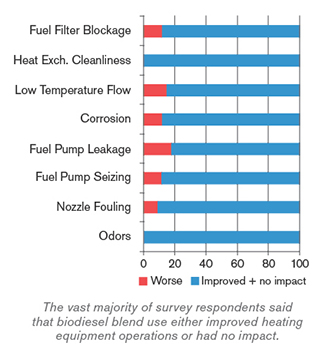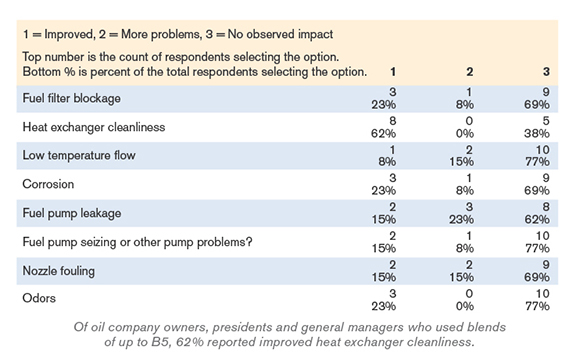More Dealers Report Improved System Performance or No Impact
“Most users of biodiesel blends for heating are not experiencing increased service requirements.” That’s the first and perhaps most notable conclusion of a recent survey conducted by the National Oilheat Research Alliance (NORA) on mechanical issues related to biodiesel blending. Results of the survey were compiled into a report prepared by NORA Director of Research Dr. Thomas Butcher.
“The transition to biofuels is a major shift for this industry,” said Dr. Butcher in an interview with Oil & Energy. “This survey is one part of our efforts to help ensure this fuel shift is done in a way that maintains and perhaps improves our traditional level of reliability while providing a renewable aspect to liquid fuels,” he added. The survey was conducted as a follow-up to a survey conducted in 2012-2013, which was sent only to individuals who had registered with NORA to use the Bioheat® trademark.
The new survey was sent to three distinct groups: individuals registered to use the NORA-owned Bioheat® trademark (Group 1); individuals who are oil marketing/service company owners, presidents or general managers (Group 2); and individuals who are service managers at oil/marketing service companies (Group 3). The number of total respondents was 139, with 25 from Group 1, 92 from Group 2, and 22 from Group 3.
The survey asked whether the use of biodiesel had a clear effect on any of the following heating equipment performance categories: fuel filter blockage, heat exchanger cleanliness, low temperature flow, corrosion, fuel pump leakage, fuel pump seizing or other fuel pump problems, nozzle fouling, and odors.
Among Group 1, 76% of the respondents said that they had used biodiesel blends, and nearly all of those reported that they were still doing so. These respondents included users of B5 and B20 blends. None of them reported an impact on equipment performance, except for one B20 user who reported improved heat exchanger cleanliness.
Among Group 2, 41.3% of respondents reported that they either currently or have in the past deliberately delivered biodiesel blends to their customers, and 94% of those respondents said they are continuing to deliver biodiesel blends. As for blend levels, 48% reported delivering B5, 18% reported delivering B20 to all of their customers, 9% reported delivering B20 to some of their customers, and 15.2% reported delivering blends over B20 to at least some of their customers.
As you can see from the chart above, 62% of Group 2 respondents who deliver up to B5 reported observing improved heat exchanger cleanliness, and in every other category of heating equipment performance, the majority of respondents reported no observed impact. Among the small set of Group 2 respondents who deliver up to B20 to all of their customers, 60% reported improvements in fuel filter blockage, 80% reported improvements in incidence of heat exchanger cleanliness and 60% reported improvements in incidence of nozzle fouling.
Among the 22 respondents in Group 3, 13 reported that they have used or continue to use biodiesel blends. According to the report, the survey responses of Group 3 users who deliver up to B5 to all of their customers “could indicate some areas of concern, including fuel filter blockage or fuel pump seizing, but the number of respondents in this category is too small to draw conclusions.” Additionally, the report later states that “where concerns are being reported, a single symptom of a biodiesel related service concern is not demonstrated. The distribution of service concerns is as broad as was reported in pre-biodiesel service surveys.”
Dr. Butcher’s report reached four conclusions:
- Most users of biodiesel blends for heating are not experiencing increased service requirements;
- Respondents clearly indicated reduced heat exchanger fouling and reduced concern about heating oil odors in homes;
- Some of the respondents reported increased fuel-related problems with biodiesel, but the response across different categories of concerns was broad. It is not possible to conclude that one area is dominant.
- For many of the concern areas identified, there was roughly an equal response of improved vs. a worse situation relative to petroleum-based heating oil. One possible exception is fuel pump leakage amongst biodiesel users, where the number of those reporting increased problems with fuel leakage was about twice the number who indicated reduced problems with fuel pump leakage.
“As noted in the report, one very important thing we were looking for was a technical problem area that stands out as a strong area in need of work,” said Dr. Butcher. “We could not identify such a problem area from these results.”


